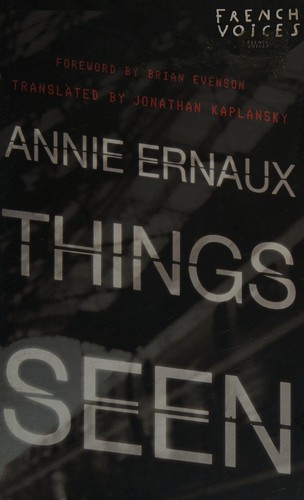Aaron recenzis Things seen de Annie Ernaux
Pointillistic observations of the life in the mid-1990s
5 steloj
I'm embarrassed to say that I was totally unfamiliar with Annie Erneaux prior to hearing the announcement that she received the Nobel Prize for Literature in 2022. So I decided to check out some of her works at the library. Things Seen is a brief (92 pages) work which consists of short observations between 1993 and 1999. Erneaux observes what she sees on the street, in stores, on the train, on television, and elsewhere. The book consists of quick, sharply drawn vignettes. She describes characters vividly only to have them disappear, just as you might see someone interesting on the subway and then never again. She has a keen eye how humans relate to one another (such as a daughter constantly berating her mother in public), and is brutally self aware regarding her own treatment of the poor. She does not give one man money in the street, but the …
I'm embarrassed to say that I was totally unfamiliar with Annie Erneaux prior to hearing the announcement that she received the Nobel Prize for Literature in 2022. So I decided to check out some of her works at the library. Things Seen is a brief (92 pages) work which consists of short observations between 1993 and 1999. Erneaux observes what she sees on the street, in stores, on the train, on television, and elsewhere. The book consists of quick, sharply drawn vignettes. She describes characters vividly only to have them disappear, just as you might see someone interesting on the subway and then never again. She has a keen eye how humans relate to one another (such as a daughter constantly berating her mother in public), and is brutally self aware regarding her own treatment of the poor. She does not give one man money in the street, but the later comes across a busker playing an enjoyable tune and felt "irresistibly prompted to search for a coin in my purse. As if pleasure were more of an incentive to give than the naked sight of need" (page 52). When attending a public presentation by a writer, she notes that "It is a ceremony where it is important that all participants feel they are playing a role. For many spectators that consists of criticizing the questions asked by others," which should hit home for anyone who has attended such an event (page 31).
I have no idea how this relates to the rest of her oeuvre, but it was absorbing and at such a length was a quick and enjoyable read.

